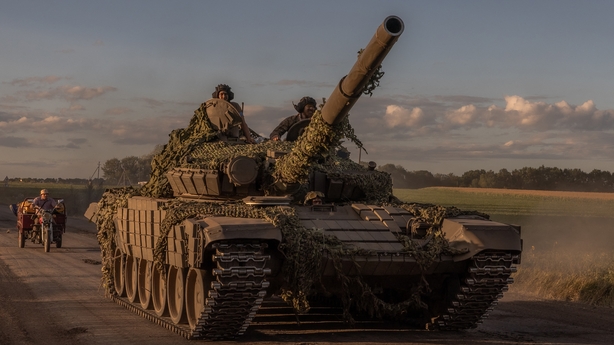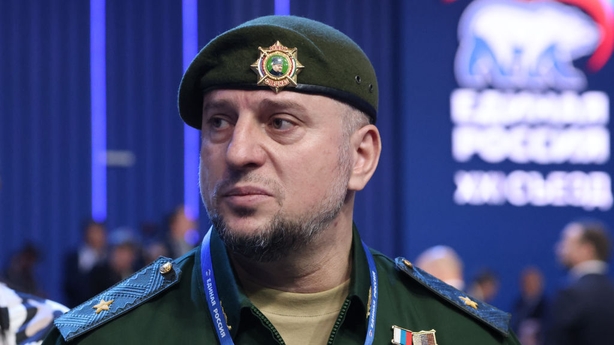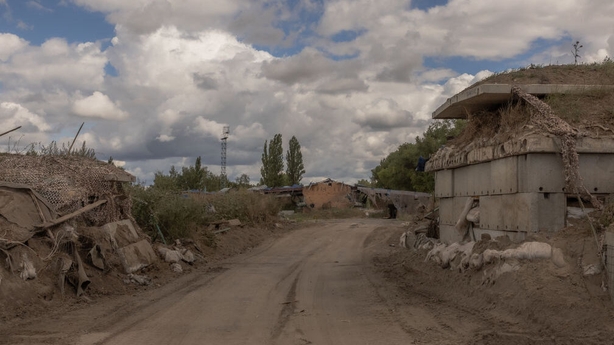Ukraine now controls 74 settlements in Russia's Kursk border region, the country's president Volodymyr Zelensky has said.
The governor of the Kursk region, where Ukraine is mounting a week-long incursion, previously said that Ukraine controls 28 settlements.
"There are 74 settlements under the control of Ukraine," Mr Zelensky said in his evening address.
Mr Zelensky said the incursion shows that Ukraine had proven again it is able to take the initiative.
"We have once again proved that in any situation, we Ukrainians are able to achieve our goals – we are able to protect our interests and our independence," he said in his nightly address to the nation.
The president said that "despite difficult, intense fighting, the advance of our forces in the Kursk region continues."
He posted footage showing him holding a video call with military chief Oleksandr Syrsky.
Mr Syrsky tells him: "As of today, our troops have advanced in some areas by one to three kilometres."
In the last day, Ukraine has taken "over 40sq/km of territory", Mr Syrsky adds, after saying earlier that the troops hold around 1,000sq/km of Russian territory.

Russian forces have struck back at Ukrainian troops with missiles, drones and airstrikes in actions that one senior commander said earlier had halted Ukraine's advance.
Thousands of Ukrainian soldiers smashed through the Russian border a week ago in a surprise attack in the Kursk region that Russian President Vladimir Putin said was aimed at improving Kyiv's negotiating position ahead of possible talks and slowing the advance of Russian forces along the front.
The Ukrainian forces carved out a slice of Russian territory, prompting Moscow to evacuate almost 200,000 people while it rushed in reserves.
Russian war bloggers reported intense battles across the Kursk front as the Ukrainians tried to expand their control, though they said Russia was bringing in soldiers and heavy weaponry and had repelled many Ukrainian attacks.
Russia's defence ministry published images of Sukhoi Su-34 bombers striking at what it said were Ukrainian troops in the Kursk border region and said it had repelled attacks at villages about 26-28km from the border.
Russian forces had destroyed a total of 35 Ukrainian tanks, 31 armoured personnel carriers, 18 infantry fighting vehicles, and 179 other armoured vehicles during in the week-long battle, it said.
"The uncontrolled ride of the enemy has already been halted," said Major General Apti Alaudinov, the commander of the Chechen Akhmat special forces unit.
"The enemy is already aware that the blitzkrieg that it planned did not work out." he added.

It was not clear which side was in control of the Russian town of Sudzha, through which Russia delivers gas from Western Siberia through Ukraine and on to Slovakia and other European Union countries. Gazprom said today it was still pumping gas to Ukraine through Sudzha.
An AFP analysis of data provided by the Institute for the Study of War found Ukraine controlled at least 800sq/km of Kursk territory.
The ISW, a non-profit research group based in Washington DC, gives regular tactical updates on Russia's invasion of Ukraine.
Ukraine's foreign ministry's spokesman said today that it has no interest in occupying the Kursk region and that its major cross-border incursion would complicate Russian military logistics and its ability to send more units to fight in Ukraine's east.
"Unlike Russia, Ukraine does not need other people's property. Ukraine is not interested in taking the territory of the Kursk region, but we want to protect the lives of our people," Heorhii Tykhyi, the spokesman, told reporters in Kyiv.
After the Russian invasion of Ukraine in 2022, Western leaders said they would help Ukraine defeat Russian troops on the battlefield and drive them out.
Ukraine recaptured large swathes of territory in 2022. But its counteroffensive in 2023 failed to pierce heavily dug-in Russian lines, and Russian forces have been advancing this year deeper into Ukrainian territory.
Russia controls just under one fifth of territory internationally recognised as Ukraine.
At his Novo-Ogaryovo residence outside Moscow, Mr Putin told officials that Russia would force out the Ukrainian troops, saying Russian forces were speeding up their advance along other parts of the front.
The Ukrainian incursion is the most serious into Russia since the June 1941 invasion by Nazi Germany, which turned on the 1943 Battle of Kursk.

By dedicating forces to Kursk, Ukraine may leave other parts of the front exposed just as Russia has been advancing. Russia which has a far larger army, could try to encircle Ukrainian forces.
Ukraine's Western backers, which have been keen to avoid an escalation of the war into a direct confrontation between Russia and the US-led NATO, said they had no prior warning of the Ukrainian offensive.
Mr Putin said the West was using Ukraine to fight a proxy war with Russia and the border incursion was an attempt to undermine Russian domestic stability.
Russia's Foreign Intelligence Service (SVR) said Mr Zelensky was taking crazy steps that risked an escalation far beyond Ukraine's borders.
Read more:
Latest Ukraine stories
In Kursk, 121,000 people had already left or have been evacuated and another 59,000 were in the process of being evacuated, local officials said.
In Russia's Belgorod region, which borders Kursk, 11,000 civilians were also evacuated, the region's governor said.
Meanwhile, Russia said it has summoned a senior Moldovan diplomat today to express "serious concern" over media reports - denied by Moldova - about the potential deployment there of F-16 fighter jets supplied by the West to Ukraine.
The Russian foreign ministry said Moscow was alarmed by speculation that F-16s could be based at Moldovan airfields and used to launch attacks on Russian territory.
Moldova's foreign ministry said the country had no plans to host aircraft destined for Ukraine.
"Moldova does not and will not host weapons and military equipment, including aircraft destined for Ukraine," the ministry said in a statement.

